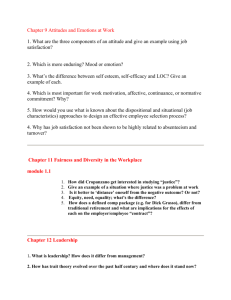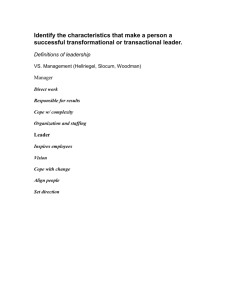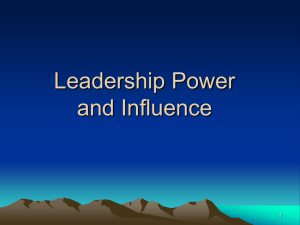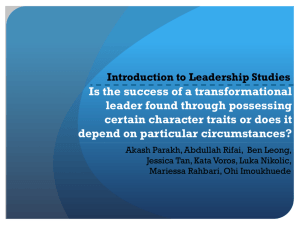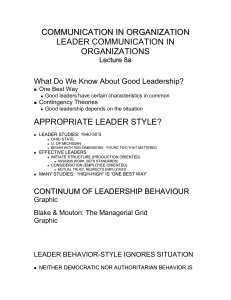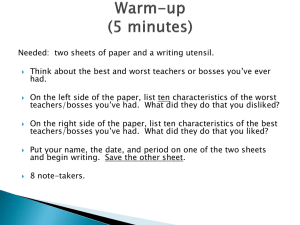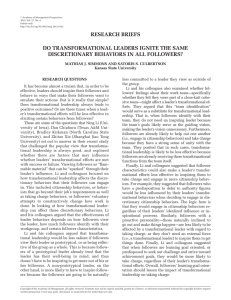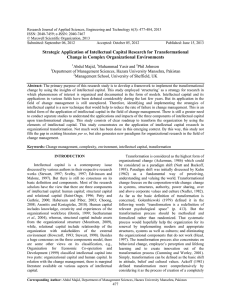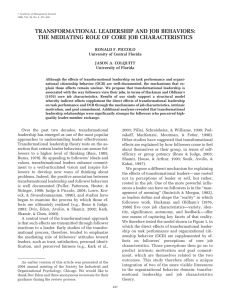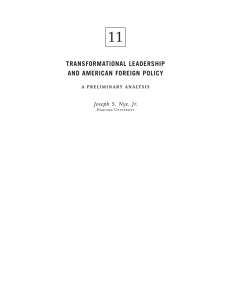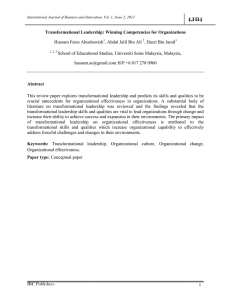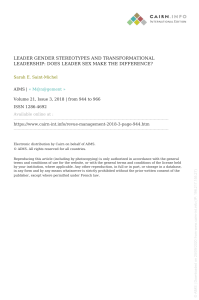Document 10823270
advertisement
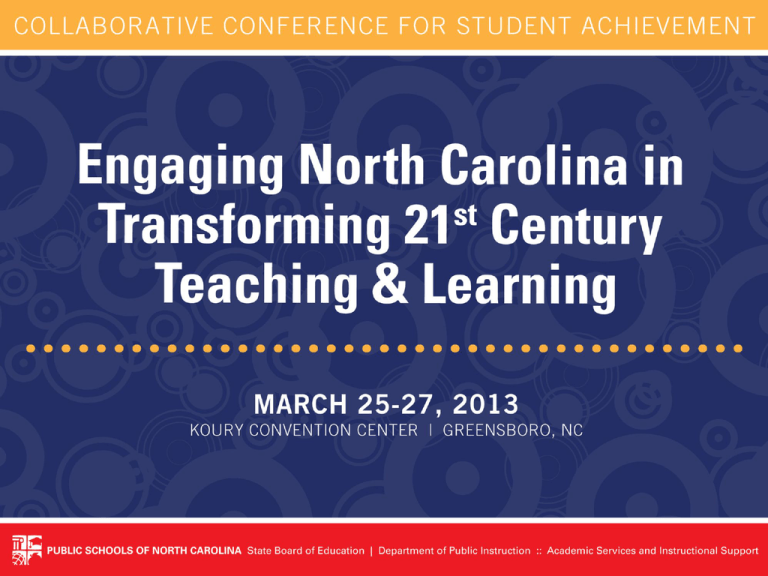
School Transformation: Reorientation Through Leadership No Cookie Cutter Approach… “Don’t be buffaloed by experts and elites. Experts often possess more data than judgment.” author? Introductions • • • • • • Terry Burks Melody Chalmers Todd Finn Candis Jones John McMillan Clinton Robinson E. E. Smith High School, Assistant Principal E. E. Smith High School, Principal New Havover High School, Principal Wake Forest-Rolesville High School, Assistant Principal East Bladen High School, Principal Wake County Area Superintendent Norms & Expectations… Participants will: • Keep cell phones on vibrate • Keep sidebar conversations from distracting others • Actively participate in meaningful activities • Engage in and respect dialogue and discourse Essential Questions 1. What does research suggest about cultural transformation in schools? 2. How does leadership impact school culture? 3. What are the guiding philosophies for school transformation? 4. What has to occur for true transformation to take place and remain sustainable once the leader leaves? A Tale of Two Cities SCHOOL A Student Expectations Teacher Expectations Consistency Discipline Gangs Transition Teaching Practices Community Involvement Community Perception Special Programs At Risk Population Attitudes and Beliefs Structure SCHOOL B A Tale of Two Cities: School “A” A Tale of Two Cities: School “B” Activity (5 min): Common Ground What were the commonalities from both schools? What changed? How did it change? What had to be in place or what drove the change? Activity (15 min): School Vignettes Identify factors which impede the school’s progress in the vignette. Complete organizational chart provided to identify other requested information. Principles of Transformational Leaders There are 4 components to transformational leadership, sometimes referred to as the 4 I's (Bass, 1985, 1988): Idealized Influence (II) the leader serves as an ideal role model for followers; the leader "walks the talk," and is admired for this Inspirational Motivation (IM) - Transformational leaders have the ability to inspire and motivate followers. Combined these first two I's are what constitute the transformational leader's charisma. • Individualized Consideration (IC) Transformational leaders demonstrate genuine concern for the needs and feelings of followers. This personal attention to each follower is a key element in bringing out their very best efforts. Intellectual Stimulation (IS) - the leader challenges followers to be innovative and creative. A common misunderstanding is that transformational leaders are "soft," but the truth is that they constantly challenge followers to higher levels of performance. Kouzes and Posner’s model of Transformational Leadership How does this picture exhibit school culture? Culture Defined norms, values, beliefs, ceremonies, rituals, traditions, and myths understood, maybe in varying which drive the thinking and actions of people within a school community. VALUES ATITTUDES BELIEFS TRADITIONS CEREMONIES AND RITUALS Changing Culture Through Changing the Mindset • A different way of thinking, a different way of attacking the issues….. changing mindsets will help change the culture of the building. • You can not be afraid to be get fired! You are one decision away from loosing your job. • Sometimes you have to “shake it up” a little bit. Models of Cultural Change Whole School Change, Jay McTighe, 2011 The Fourth Way of Change, Hargraves & Shirley The Process of Change Authentic Experiences Impeding YR 1 Progress/Concern Discipline Lack of high expectations and consistency Community Negative perception of school due to … Attitudes/Bel ief of Teachers Students couldn’t achieve because… YR 2 Fort Bragg Partnership FSU Memorandum of Agreement Academic Achievement & Growth America’s Choice Our Students Our Content Our Choice Athletics D/F List Recruitment of personnel YR 3 YR 4 YR 5 Seminar Evolution Flipping the schedule Academic Contracts Authentic Experiences Impeding YR 1 Progress/Concern YR 2 YR 3 YR 4 YR 5 WHEN TO DECIDE THERE NEEDS TO BE A SHIFT Educational Philosophies of Transformation as a Process o Listen to Whispers before they become Screams o … One Bite at a Time o Care Enough to Confront o Excellence Will be Standard… Not in Some Things, but in All Things • Trust but Verify Listen to Whispers Before They Become Screams- Step 1 o Observe, Listen, and Identify o By listening to stakeholders, and then addressing concerns, a consensus is developed to move forward which creates buy-in … One Bite at a Time - STEP 2 o Prioritize and Narrow Focus Care Enough to Confront – STEP 3 o Having the courage to confront issues despite unpopularity and a lack of support and or consensus Excellence will be Standard…not in some things but in all things… - STEP 4 o High Expectations and High Standards…… NO EXCUSES! o Policies and Procedures Excellence will be Standard…not in some things but in all things… - STEP 4 Trust but Verify – Step 5 o Empower but monitor, evaluate, reflect, and readjust. Example from School A • • • • • Step 1 Step 2 Step 3 Step 4 Step 5 Example from School B • • • • • Step 1 Step 2 Step 3 Step 4 Step 5 ACTIVITY (15 min): Process Application • List reasons why your school is not achieving to your level of expectations • Compile a list as a table group • Choose one • Troubleshoot the concern by completing the process modeled for you and brainstorm how to address the issue Panel Discussion Q & A (20 min) Closure… As a leader what should you be doing in your building in order to move it forward. • Listen to whispers before they becomes screams… • Care enough to confront issues….. • Create your own Reform Model with a strategic 3 year plan. • Create a 60-Day Plan with benchmark dates • Create a 90-Day Plan with benchmark dates • Hire good people and help negative ones transition PARKING LOT • What is clearer to you now?
